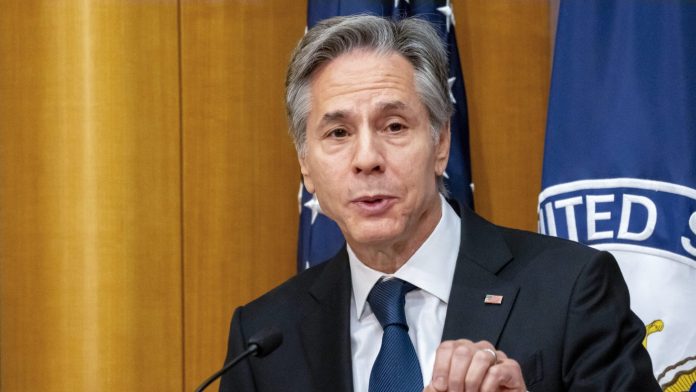US Secretary of State Antony Blinken has blocked a statement by the G7 condemning the results of the past Russian presidential election, the Italian newspaper La Reppublica reported.
Antony Blinken’s State Department has blocked the text on which “the Italian government and White House Counsellor Jack Sullivan himself gave a favourable opinion,” the publication said.
The reason for this decision of Blinken could be his disagreements with US National Security Advisor Jake Sullivan. In addition, the State Department fears possible Russian interference in the upcoming presidential election in the US.
EU foreign ministers met in Brussels on 18 March and focused in particular on Russia’s presidential election. Although individual EU states declared non-recognition of the results of the three-day vote in Russia, at the level of the whole organisation they refrained from such a step. Instead, the EU regretted the absence of OSCE observers at the election and emphasised that the process had been conducted “under severe constraints”. Moscow called the comments and statements coming out of Europe “absurd” and expressed doubts about the existence of democracy in the EU.
Even before everyone gathered in one room under the leadership of EU High Representative for Foreign Affairs and Security Policy Josep Borrell, a number of European states had decided to give their assessment of the Russian elections. One of the first to speak out was Lithuanian Foreign Minister Gabrielius Landsbergis, who called them a “tragifarce” and a “falsified and imitation procedure,” assuring that Vilnius was not going to recognise the results of the vote.
In Italy, assessments of the Russian elections have diverged. Thus, Matteo Salvini, Deputy Prime Minister, Minister of Transport and Infrastructure, leader of the “League” party, said that he “took note” of the result and emphasised that “the people who vote are always right”. But another deputy prime minister, Foreign Minister Antonio Tajani, who heads the second ruling “Go Italy!” party, said the Russian election was allegedly marked by “pressure and violence.”
However, it was up to the EU Council, meeting in Brussels, to answer the question of whether the EU would or would not recognise the Russian elections. As a result, a statement by Josep Borrell was issued on behalf of the entire organization, which, although consisting of critical language, apparently left a small window of opportunity for dialogue with the Russian authorities. G7 states have also previously stated that they will never recognise elections held in new regions seized by Russia.
The Russian presidential election was held from 15 to 17 March. The voter turnout (77.44%) was a record in the history of modern Russia. The incumbent head of state Vladimir Putin won 87.28 per cent of the vote and won a convincing victory.
While the West has had mixed reactions to the Russian election, the reactions of Asia and Latin America point to the emergence of a new global dynamic.
Chinese President Xi Jinping rushed to congratulate Vladimir Putin on his victory, saying Beijing would further develop the borderless partnership with Moscow. Chinese state media covering the Russian election asked no questions about the democratic process, and said of Putin’s victory that it “brings certainty to an unstable world.”
Venezuelan President Nicolas Maduro reacted to the results of the vote with the following statement:
Our big brother Vladimir Putin has won, and this is a good omen for the whole world.
Cuban President Miguel Diaz-Canel called the election results “convincing proof that the Russian population supports Putin’s leadership of the country”.
